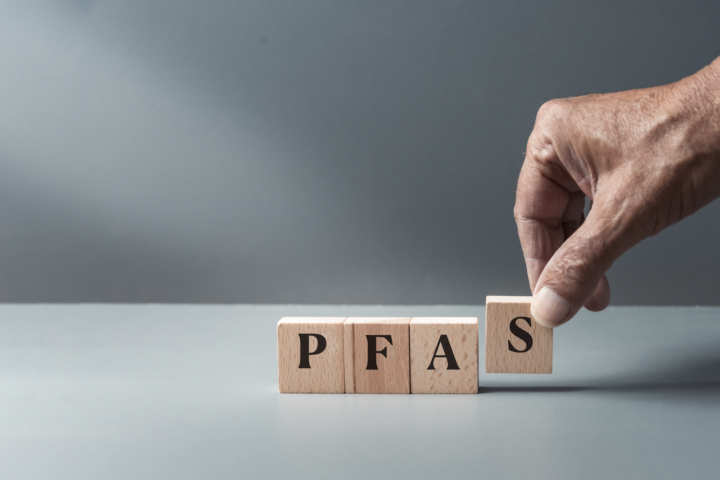
Inspection report calls pesticide ban into question
On 12 December, the federal government announced the ban of the fungicide chlorothalonil – although a report classified two degradation products as «not relevant».
Friday, February 21, 2020
The most important facts in brief:
At the end of 2019, the federal government banned the fungicide chlorothalonil.
The government took this decision even though an inspection report by the Federal Food Safety and Veterinary Office (FSVO) had categorised the controversial degradation products as «not relevant».
The federal government issued the ban in contradiction to the findings of its own authority.
Syngenta has therefore filed an appeal against the ban with the Federal Administrative Court.
This article by Stefan Häne was first published in Tages-Anzeiger on 20 February 2020.
Switzerland has caught up with the EU. The federal government banned chlorothalonil at the beginning of the year. However, the controversy over the fungicide, which has been used primarily in agriculture since the 1970s, continues – and not just because many people are wondering whether drinking water is still safe to drink (which is the case, according to the authorities).
A letter that Syngenta has sent to the federal authorities shows how controversial the case has become. The Basel-based agrochemical company, which produces chlorothalonil, sharply criticizes the «communication» of the Federal Food Safety and Veterinary Office (FSVO) in particular. According to the letter, which is dated 4 February the office is creating «uncertainty» among drinking water suppliers and the public «without any reason to do so. It was signed by Roman Mazzotta, Country President of Syngenta Switzerland, and the Managing Director Stefan Odermatt.
Switzerland followed the EU
It was controversially discussed whether the ban imposed was the result of proper risk assessment or the whole thing has been politically motivated. Last year, cantonal chemists analysed around 300 drinking water samples throughout Switzerland and Liechtenstein. In a total of twelve of these, they found concentrations above the legally permitted maximum value of 0.1 micrograms per litre, the majority of which were chlorothalonil sulfonic acid, a degradation product of chlorothalonil with the designation R417888.
Investigations by the ETH Water Research Institute also brought to light another degradation product that was found in groundwater in concentrations of up to 2.7 micrograms per litre: the substance with the designation R471811.
It was not least these findings that fuelled the controversy surrounding the use of pesticides in Switzerland. Parliamentarians submitted motions, and the SP Federal Councillor in charge, Alain Berset, spoke of a policy of «zero tolerance».
Pressure had already been mounting on the federal government to withdraw the fungicide from the market: the European Food Safety Authority had concluded that a health risk could not be ruled out for chlorothalonil degradation products. The EU Commission subsequently imposed a ban on the fungicide in spring 2019.
No maximum values exceeded
Berset's experts at the FSVO share the EU Commission's assessment that chlorothalonil «must be classified as probably carcinogenic». This was stated in the communication dated 12 December 2019 in which the federal authorities announced the ban on the fungicide – half a month before it came into force.
However: The two degradation products mentioned are categorised as «not relevant» – not only by Syngenta, but also by the FSVO itself. This is confirmed by an inspection report from the Federal Office dated 3 December 2019, meaning that Berset's experts were already aware of this fact when the federal authorities announced the ban on 12 December.
The classification as «not relevant» means that a significantly higher maximum value applies to these degradation products: 10 micrograms per litre instead of just 0.1 as with «relevant» substances. Accordingly, Syngenta calculates that no maximum values were exceeded at any of the measurement sites. The FSVO does not deny this statement.
Syngenta therefore accuses the FSVO of acting contradictorily – a criticism that the Office rejects: chlorothalonil has caused kidney tumours in rats and mice, writes the FSVO on request. The FSVO therefore considers the requirement for classification as «probably carcinogenic» to be fulfilled.
According to the FSVO, all degradation products (so-called metabolites) that were measured above the limit value of 0.1 micrograms are therefore automatically «relevant» - «regardless of studies on metabolites that deny a carcinogenic effect». «This ensures that consumers in Switzerland do not come into contact with pesticides with worrying toxicological properties.»
Not yet classified more strictly
Syngenta disputes this automatism. The chemical company considers the ban to be «disproportionate and arbitrary»: even if an active substance such as chlorothalonil is classified more strictly, a metabolite is not necessarily relevant. Syngenta is asking the FSVO to name the legal basis for the procedure. When asked by this newspaper, the FSVO referred to the Plant Protection Products Ordinance. According to this, the «technical documents and guidelines» adopted in the EU are taken into account in the assessment of pesticides.
In this context, it is important to note that chlorothalonil is still classified as category 2 in the EU. This means that it is «only» suspected of being possibly carcinogenic, i.e. it is not «probably carcinogenic» (category 1B), as the EU Commission says. The difference is due to the fact that the EU Commission has adopted the assessment of the European Food Safety Authority.
However, the European Chemicals Agency is responsible for the classification. But this specialised agency has apparently not yet reassessed the fungicide. According to the FSVO: «The safety of consumers in Switzerland should not depend on an administrative process in the EU.» The FSVO therefore reacted immediately.
Report remained unpublished for a long time
The government authorities were less of a hurry to publish the new inspection report from 3 December. The FSVO only published it on its website last Friday. It also took its time to respond to the letter from Syngenta. The company, which is «greatly affected» by the federal government's ban, requested a response by 10 February.
The deadline has long since passed. The FSVO defends itself: «We endeavour to treat all our customers equally and to provide a response within two weeks.» This will also be the case with Syngenta.
The points of contention will come up again in court at the latest. Syngenta has filed an appeal against the ban with the Federal Administrative Court. A lot of money is at stake. It takes around ten years for a new active ingredient to reach the market. According to Syngenta, the costs amount to around 260 million Swiss francs. Reliable framework conditions are crucial for Switzerland as a research powerhouse, says spokeswoman Regina Ammann.
Fact sheet on the ban on the fungicide chlorothalonil
A fact sheet on the ban on the fungicide chlorothalonil and the background to the legal dispute can be found on the Syngenta website.
Facts about the chlorothalonil ban in Switzerland (PDF, 147.93 KB)
Related articles

"Natural is healthy, chemicals are toxic."
Everything that occurs in nature is healthy and synthetically produced substances, i.e. "chemical" substances, are toxic. This myth is fundamentally wrong: There are many highly toxic substances in nature, and at the same time there are many synthetic substances that are absolutely harmless.

Pesticide cuts
In Switzerland, a growing number of pesticides are being banned by the authorities. At the same time, there are almost no new ones entering the market. The regulatory authorities are severely overstretched. Things cannot go on like this. Every product that disappears from the market increases the risk of pests developing resistance and of crops failing.

Science demonstrates the concrete benefits of new breeding methods
The Swiss Academy of Sciences (SCNAT) recognizes the significant opportunities offered by new breeding methods. In a new dossier, the Academy presents five examples of crops cultivated using genome editing, which have high potential for Swiss agriculture. This publication emphasizes the scientific consensus on the use of genetic scissors. The new breeding methods offer numerous advantages for the environment and agriculture.

Assess scientifically instead of banning indiscriminately
The debate surrounding PFAS is gaining momentum in Switzerland. At its core are questions about potential risks to human health and the environment, as well as future regulatory approaches. A differentiated, science-based approach is essential – as emphasised by scienceindustries in a short interview with Dominique Werner, Head of Chemicals Regulation.

Faster Approval of Crop Protection Products Long Overdue
Switzerland diligently bans active substances that have also been withdrawn from the market in the EU. Conversely, it is dragging its feet: modern products that are approved in neighboring countries remain blocked. With the adoption of the amendment to the Agriculture Act, the National Council has now taken an important step toward faster approval of plant protection products.

Differing perceptions
While the increasing administrative burden is perceived as the main concern in the economy, parts of the population see it differently. Meanwhile, regulations are repeatedly misused as a means of exerting power in the competitive struggle – to the detriment of SMEs.

Domestic production as a blind spot
Switzerland's food security is increasingly under pressure: last year's disastrous wheat and potato harvests have led to an increasing dependence on imports. However, the report by the Federal Office for National Economic Supply (FONES) is largely silent on the precarious state of the domestic agricultural sector. The IG BauernUnternehmen (Farmers' Company) has therefore sharply criticised the federal government.

